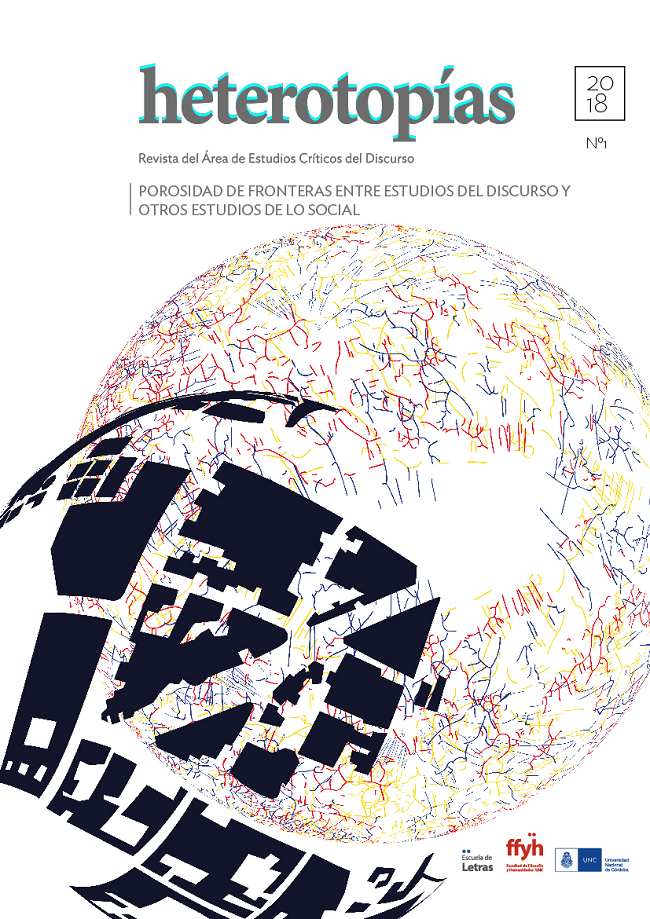"Todo lo que es sólido (casi) se desvanece en el aire, todo lo sagrado (casi) se vuelve profano": manifestaciones discursivas de una crisis de hegemonía cultural
Main Article Content
Abstract
This article analyzes how different utterances were signified, processed and disputed between August 1st and September 27th, 2017. This lapse -that expands from the disappearance of Santiago Maldonado after the intervention of Gendarmerie in Pu Lof in Resistance in Cushamen to the unanimous approval by the Senate of the extension of Law 26,160- has shown an unprecedented discursive dynamics among members of the political society. The indigenous issue reached the national agenda profusely, even if it was to speak progressively less and less about the Mapuche, than of several other things based on them. Vis-à-vis the unusual increase of cross imputations that update signs such as "state terrorism" or "destabilization of democracy" and seemed to collapse agreements of coexistence, we wonder how and why the Senate achieves full consensus to renew the Law. We thus analyze discourse as a social practice, and pay attention to its effects and rearticulations in flow. We circumscribe the corpus to some exchanges among the political society in situations of enunciative friction - journalistic interviews, press conferences, or interpellations to officials of the Executive Power in the Senate and in Deputies. To analyze the attempts to re-agree shared floors, we analyze the debate that leads to the extension of the Law. We argue that, in the face of overflows that seemed to announce a crisis of cultural hegemony – not only as a moral and intellectual leadership that articulates consensus and consent, but also as an agreed contentious language to channel conflicts - the senators chose to relocate the discussions, rehearsing practices that allowed renegotiated common floors.
Downloads
Article Details
Those authors who have publications with this journal, accept the following terms: Those authors who have publications with this journal, accept the following terms:
a. The authors will keep their copyright and guarantee to the journal the right of first publication of their work, which will be simultaneously subject to the Creative Commons Attribution - Non-Commercial - Share Alike (by-nc-sa) Attribution License; no commercial use of the original work or any derivative works is allowed, the distribution of which must be done with a license equal to the one that regulates the original work.
b. Authors may adopt other non-exclusive license agreements for the distribution of the published version of the work (e.g., deposit it in an institutional telematic archive or publish it in a monographic volume) provided that the initial publication in this journal is indicated.
c. Authors are allowed and recommended to disseminate their work through the Internet (e.g. in institutional telematic archives or on their website) before and during the submission process, which may lead to interesting exchanges and increase the number of citations of the published work. (See The effect of open access).
References
BERMAN, Marshall. (1988). All That Is Solid Melts Into Air. The Experience of Modernity. New York: Penguin Books.
BRIGGS, Charles. (1986). Learning how to ask: A sociolinguistic appraisal of the role of the interview in social science research. Cambridge: Cambridge University Press.
BRIONES, Claudia. (1998) La alteridad del "Cuarto Mundo". Una deconstrucción antropológica de la diferencia. Buenos Aires: Ediciones del Sol.
BRIONES, Claudia. (2014). "Los derechos territoriales de los pueblos indígenas en Argentina. Un balance de los reconocimientos y las políticas". En Alcida Ramos (comp.). Constituciones Nacionales y Pueblos Indígenas (pp. 179-233). Popayán, Colombia: Editorial Universidad del Cauca.
BRIONES, Claudia. (2015). “Políticas indigenistas en Argentina: entre la hegemonía neoliberal de los años noventa y la ‘nacional y popular’ de la última década”. Antípoda. Revista de Antropología y Arqueología, 21, 21-48.
FAIRCLOUGH, Norman. (1992). Discourse and Social Change. Oxford: Polity Press.
GROSSBERG, Lawrence. (2009). “El corazón de los estudios culturales: Contextualidad, construccionismo y complejidad”. Tabula Rasa, 10, 13-48.
HCDN (Honorable Cámara de Diputados de la Nación) (2017a). "Informe del Sr. Jefe de Gabinete de Ministros Lic. Marcos Peña A fin de dar cumplimiento a lo dispuesto por el artículo 101 de la Constitución Nacional". 30 de agosto. Recuperado de: https://www.youtube.com/watch?v=aZxCpKkNg_w&list=PL93Is8g0fzepkE50UZ8DROdRJJIIJuzSB&index=1. Desgrabaciones de las autoras.
HCDN (Honorable Cámara de Diputados de la Nación) (2017b). "Informe 105 del 4 de octubre de 2017". Jefatura de Gabinete de Ministros. Presidencia de la Nación. Recuperado de: https://es.scribd.com/document/360571563/INFORME-105-4-de-Octubre-de-2017.
HCSN (Honorable Cámara del Senado de la Nación) (2017a). "Reunión de la Comisión de Seguridad Interior y Narcotráfico del 16 de agosto de 2017". Versión Taquigráfica. Recuperado de: http://www.senado.gov.ar/upload/23198.pdf.
HCSN (Honorable Cámara del Senado de la Nación) (2017b). "VERSIÓN TAQUIGRÁFICA (PROVISIONAL) Período 135º 13.ª Reunión. 8.ª Sesión especial. 27 de septiembre de 2017". Recuperado de: http://www.senado.gov.ar/upload/23705.pdf.
MARX, Karl y ENGELS, Frederick. (1848). Manifiesto del Partido Comunista. Recuperado de: https://www.marxists.org/espanol/m-e/1840s/48-manif.htm.
MOUFFE, Chantal. (1991). "Hegemonía e Ideología en Gramsci". En Antonio Gramsci y la realidad colombiana (pp. 167-227). Bogotá: Foro Nacional.
MUZZOPAPPA, Eva y RAMOS, Ana Margarita. (2017). “Una etnografía itinerante sobre el terrorismo en Argentina: paradas, trayectorias y disputas”. Antípoda. Revista de Antropología y Arqueología, 29, 123-142.
TROUILLOT, Michel-Rolph. (1995). Silencing the Past: Power and the Production of History. US: Beacon Press.
WINOCUR, Rosalía. (2002). Ciudadanos mediáticos: la construcción de lo público en la radio. Barcelona: Gedisa.
